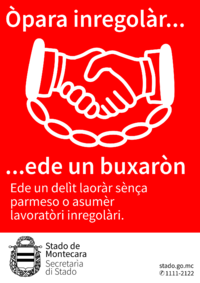Montecaran nationality law: Difference between revisions
No edit summary |
No edit summary |
||
| Line 1: | Line 1: | ||
'''Montecaran | '''Montecaran nationality law''' governs the acquisition and loss of [[Montecara|Montecaran]] {{wp|citizenship}}. It is laid out in the [[Constitution of Montecara]] and in statutes. Montecara does not recognize {{wp|multiple citizenship}}. | ||
== Acquisition of citizenship == | == Acquisition of citizenship == | ||
=== By birth === | === By birth === | ||
Anyone who is born to | Montecara applies the principle of '''{{wp|jus sanguinis}}'''. Anyone who is born to a Montecaran citizen parent is a Montecaran citizen by right. This is considered {{wp|prima facie}} if the child is the offspring either of a married couple where at least one parent is Montecaran, or of a single Montecaran woman. In cases where Montecaran citizenship would issue through an unmarried Montecaran father, a paternity test is required. Foreign children adopted by Montecarans become citizens when the adoption is finalized. {{wp|Foundlings}} in Montecaran territory are considered Montecaran citizens until a parent is discovered. | ||
=== By naturalization === | === By naturalization === | ||
Prospective citizens generally must first acquire {{wp|permanent resident}} status and live in Montecara for at least twelve years while adhering to the terms of their residency agreement. (Time spent living in Montecara while a minor counts double.) Once the time requirement has been met, an application fot naturalization can be submitted. In order for an application to be successful, the applicant must speak fluent [[Montecaran language|Montecaran]] and, if under the age of 30, have completed their national service requirement. | |||
In order for an application to be successful, the | |||
== Loss of citizenship == | == Loss of citizenship == | ||
| Line 27: | Line 14: | ||
* Serving in the military of a foreign country | * Serving in the military of a foreign country | ||
* Serving in civil office in a foreign country | * Serving in civil office in a foreign country | ||
* Being adopted by foreign parents | * Being adopted by foreign parents, if a minor | ||
Montecarans may voluntarily renounce their citizenship only before a consul abroad, and any renunciation will be accepted only if another citizenship has been acquired in order to prevent {{wp|statelessness}}. | Montecarans may voluntarily renounce their citizenship only before a consul abroad, and any renunciation will be accepted only if another citizenship has been acquired in order to prevent {{wp|statelessness}}. | ||
| Line 44: | Line 31: | ||
* Protect Montecara through military service or essential service under civil direction when called upon | * Protect Montecara through military service or essential service under civil direction when called upon | ||
* Obey all Montecaran laws | * Obey all Montecaran laws | ||
{{Template:Montecara topics}} | {{Template:Montecara topics}} | ||
[[Category:Montecara]] | [[Category:Montecara]] | ||
[[Category:Law]] | [[Category:Law]] | ||
Revision as of 06:49, 7 January 2023
Montecaran nationality law governs the acquisition and loss of Montecaran citizenship. It is laid out in the Constitution of Montecara and in statutes. Montecara does not recognize multiple citizenship.
Acquisition of citizenship
By birth
Montecara applies the principle of jus sanguinis. Anyone who is born to a Montecaran citizen parent is a Montecaran citizen by right. This is considered prima facie if the child is the offspring either of a married couple where at least one parent is Montecaran, or of a single Montecaran woman. In cases where Montecaran citizenship would issue through an unmarried Montecaran father, a paternity test is required. Foreign children adopted by Montecarans become citizens when the adoption is finalized. Foundlings in Montecaran territory are considered Montecaran citizens until a parent is discovered.
By naturalization
Prospective citizens generally must first acquire permanent resident status and live in Montecara for at least twelve years while adhering to the terms of their residency agreement. (Time spent living in Montecara while a minor counts double.) Once the time requirement has been met, an application fot naturalization can be submitted. In order for an application to be successful, the applicant must speak fluent Montecaran and, if under the age of 30, have completed their national service requirement.
Loss of citizenship
Montecaran citizenship may be lost immediately by performing certain actions, including:
- Intentionally acquiring the citizenship of another country
- Becoming a member of a royal or noble house
- Serving in the military of a foreign country
- Serving in civil office in a foreign country
- Being adopted by foreign parents, if a minor
Montecarans may voluntarily renounce their citizenship only before a consul abroad, and any renunciation will be accepted only if another citizenship has been acquired in order to prevent statelessness.
Rights and duties of citizens
Citizens of Montecara have the right to:
- Participate in politics, including by membership in the Popular Assembly or Senate
- Live and work indefinitely in Montecara
- Obtain a Montecaran passport
- Enter or leave Montecara at will
- Own real property in Montecara
Citizens of Montecara have the duty to:
- Serve in civil office or as a lay judge when called upon
- Protect Montecara through military service or essential service under civil direction when called upon
- Obey all Montecaran laws
